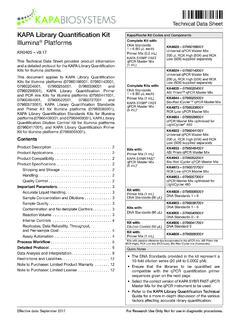Transcription of KAPA HiFi HotStart ReadyMixPCR Kit KK2600 KK2601 KK2602 …
1 Technical Data SheetEffective date: January 2017 For Research Use Only. Not for use in diagnostic HiFi HotStart ReadyMixPCR KitKR0370 DescriptionKAPA HiFi HotStart DNA Polymerase is a novel B-family DNA polymerase, engineered to have increased affinity for DNA, without the need for accessory proteins or DNA binding domains. The intrinsic high processivity of the enzyme results in significant improvement in yield, speed and sensitivity when compared with wild-type B-family DNA polymerases. In addition, the ability to amplify long targets, as well as GC- and AT-rich targets, is significantly improved. The enzyme is combined with a proprietary antibody that inactivates the enzyme until the first denaturation step. This prevents nonspecific amplification during reaction setup, increases sensitivity, and improves reaction the ReadyMix PCR Kit, KAPA HiFi HotStart DNA Polymerase is supplied in a convenient 2X ReadyMix format, containing all reaction components except primers and template.
2 The ReadyMix contains KAPA HiFi HotStart DNA Polymerase ( U per 25 L reaction) in a proprietary reaction buffer containing dNTPs ( mM of each dNTP at 1X), MgCl2 ( mM at 1X) and HiFi HotStart ReadyMix is designed for routine, high-fidelity PCR of a wide range of targets and fragment sizes. It offers error rates approximately 100 times lower than wild-type Taq DNA polymerase, and higher success rates and yields than achievable with wild-type B-family (proofreading) DNA polymerases. In addition, KAPA HiFi HotStart requires significantly shorter reaction times than wild-type B-family DNA HiFi HotStart DNA Polymerase has 5 g3 polymerase and 3 g5 exonuclease (proofreading) activity, but no 5 g3 exonuclease activity. The strong 3 g5 exonuclease activity results in superior accuracy during DNA amplification, lending to KAPA HiFi HotStart DNA Polymerase the lowest published error rate of all B-family DNA polymerases (1 error per x 106 nucleotides incorporated).
3 This fidelity is approximately 100 times higher than that of wild-type Taq DNA polymerase, and up to 10 times higher than that of other B-family DNA polymerases and polymerase fragments generated with KAPA HiFi HotStart ReadyMix may be used for routine downstream analysis and applications, including restriction enzyme digestion, cloning and sequencing. PCR products generated with KAPA HiFi HotStart ReadyMix are blunt-ended, but may be 3 -dA-tailed for cloning into TA cloning vectors (see Important Parameters: TA cloning).Kapa/Roche Kit Codes and ComponentsKK260007958919001 KAPA HiFi HotStart ReadyMix (2X)* mLKK260107958927001 KAPA HiFi HotStart ReadyMix (2X)* mLKK260207958935001 KAPA HiFi HotStart ReadyMix (2X)* mL* Contains mM MgCl2 at 1 XQuick Notes KAPA HiFi HotStart ReadyMix PCR Kits contain the engineered KAPA HiFi HotStart DNA Polymerase developed for fast and versatile high-fidelity PCR.
4 Buffer, MgCl2, dNTPs and enzyme are supplied in a convenient 2X ReadyMix just add primers and template. KAPA HiFi HotStart DNA Polymerase has the lowest published error rate of all B-family DNA polymerases (1 error per x 106 nucleotides incorporated). Amplify targets up to 15 kb from genomic DNA or 20 kb from less complex targets. Denature at 98 C for 20 sec per cycle. Optimal annealing temperatures are typically higher than in other PCR buffer systems. Use an annealing temperature gradient to determine the optimal annealing temperature. To ensure the highest fidelity, use high quality DNA and the lowest possible number of ApplicationsThe KAPA HiFi HotStart PCR Kit is ideally suited for: PCR for conventional sequencing (direct sequencing or sequencing of cloned PCR products) Next-generation sequencing library amplification (when used in conjunction with the KAPA Library Amplification protocol) Amplification of DNA fragments for cloning and protein expression or genomic characterization Site-directed more information on these and other high-fidelity PCR applications, please refer to the KAPA HiFi Application Notes on Site-Directed Mutagenesis, Routine High-Fidelity PCR, and High-Fidelity GC-rich PCR available from Data SheetKAPA HiFi HotStart ReadyMix PCR Kit2 For Research Use Only.
5 Not for use in diagnostic PCR ProtocolIMPORTANT! The KAPA HiFi HotStart ReadyMix contains an engineered B-family (proofreading) DNA polymerase and uniquely-formulated buffers, and requires specialized reaction conditions. If these conditions are not adhered to, reaction failure is likely. Refer to Important Parameters for more 1: Prepare the PCR master mix KAPA HiFi HotStart reactions MUST be set up on ice since the high proofreading activity of the enzyme will result in rapid primer degradation at room temperature. Ensure that all reagents are properly thawed and mixed. Prepare a PCR master mix containing the appropriate volume of all reaction components common to all or a subset of reactions to be performed. Calculate the required volumes of each component based on the following table:Component25 L reaction1,2 Final waterUp to 25 LN/A2X KAPA HiFi HotStart ReadyMix3, L1X10 M Forward M10 M Reverse MTemplate DNA5As requiredAs required1 Reaction volumes may be adjusted between 10 50 L.
6 For volumes other than 25 L, scale reagents proportionally. Reaction volumes >50 L are not recommended. 2 When using for next-generation sequencing library amplification, please use protocol provided with the KAPA Library Amplification KAPA HiFi HotStart ReadyMix contains mM MgCl2 (1X). Additional MgCl2 may be added separately, but is unlikely to be KAPA HiFi HotStart ReadyMix contains mM of each dNTP (1X), and U of KAPA HiFi HotStart DNA Polymerase (per 25 L reaction) in a proprietary reaction Use <100 ng genomic DNA (10 100 ng) and <1 ng less complex DNA ( 1 ng) per 25 L reaction as first 2: Set up individual reactions Transfer the appropriate volumes of PCR master mix, template and primer to individual PCR tubes or wells of a PCR plate. Cap or seal individual reactions, mix and centrifuge 3: Run the PCR Perform PCR with the following cycling protocol1:StepTemperatureDurationCyclesI nitial denaturation295 C3 min1 Denaturation398 C20 sec15 357 Annealing4,560 75 C15 secExtension672 C15 60 sec/kbFinal extension72 C1 min/kb11 When using for next-generation sequencing library amplification, please use protocol provided with the KAPA Library Amplification Initial denaturation for 3 min at 95 C is sufficient for most applications.
7 Use 5 min at 95 C for GC-rich targets (>70% GC content).3 KAPA HiFi HotStart ReadyMix has a higher salt concentration than conventional PCR ready-mixes, which affects DNA melting. To ensure that complex and GC-rich targets are completely denatured, use a temperature of 98 C for denaturation during In addition to DNA melting, high salt also affects primer annealing. The optimal annealing temperature for a specific primer set is likely to be different (higher) than when used in a conventional PCR ready-mix. An annealing temperature gradient PCR is recommended to determine the optimal annealing temperature with the KAPA HiFi HotStart ReadyMix. If gradient PCR is not feasible, anneal at 65 C as a first Two-step cycling protocols with a combined annealing/extension temperature in the range of 68 75 C and a combined annealing/extension time of 30 sec/kb may be Use 15 sec extension per cycle for targets 1 kb, and 30 60 sec/kb for longer fragments, or to improve For highest fidelity, use 25 cycles.
8 In cases where very low template concentrations or low reaction efficiency results in low yields, 30 35 cycles may be performed to produce sufficient product for downstream ParametersAnnealing temperatureDue to the high salt concentration of the KAPA HiFi HotStart ReadyMix, the optimal annealing temperature for a given primer set is usually different when compared with a different buffer system. When using the kit with a specific primer pair for the first time, determine the optimal annealing temperature with annealing temperature gradient PCR. We recommend a gradient from 60 72 C, although some assays may require even higher annealing temperatures. For assays with optimal annealing temperatures of 68 C or higher, 2-step cycling may be performed at the optimal annealing temperature. Optimal annealing temperatures below 60 C are rare, but may be required when using primers with a high AT a gradient PCR is not feasible, use an annealing temperature of 65 C as a first approach, and adjust the annealing temperature based on the results obtained:Technical Data SheetKAPA HiFi HotStart ReadyMix PCR KitFor Research Use Only.
9 Not for use in diagnostic procedures. 3 If a low yield of only the specific product is obtained, lower the annealing temperature in 1 2 C increments. If nonspecific products are formed in addition to the specific product, increase the annealing temperature in 1 2 C increments. If no product is formed (specific or nonspecific), reduce the annealing temperature by 5 C. MgCl2 concentration may have to be increased. If only nonspecific products are formed (in a ladder-like pattern), increase the annealing temperature by 5 C or try recommendations for GC-rich PCR (see Important Parameters: GC-rich PCR).NOTE: The optimal annealing temperature for a specific primer pair with KAPA HiFi HotStart ReadyMix is typically 2 3 C lower than the optimal annealing temperature in KAPA HiFi Fidelity Buffer, and 2 3 C higher than the KAPA HiFi GC Buffer optimal annealing and Template DNA qualityAnother critical factor for successful PCR with KAPA HiFi HotStart ReadyMix is primer design and quality.
10 Primers should be carefully designed to eliminate the possibility of primer-dimer formation and nonspecific annealing as far as possible, and should have a GC content of 40 60%. Primers with GC content >60% may require higher denaturation temperatures and/or longer denaturation times, while primers with GC content <40% may require annealing temperatures <60 C, and/or increased MgCl2 and primer concentrations. Furthermore, primer sets should be designed to have similar theoretical melting : Always dilute and store primers in a buffered solution ( 10 mM Tris-HCl, pH ) instead of PCR-grade water to limit degradation and maintain primer template DNA is essential for high-fidelity amplification. Degraded, damaged, or sheared template DNA is particularly problematic when amplifying longer fragments (>1 kb). To limit degradation and maintain template quality, always dilute and store DNA in a buffered solution ( 10 mM Tris-HCl, pH ) instead of PCR-grade from low-complexity templates, such as plasmid DNA, generally requires minimal optimization.






